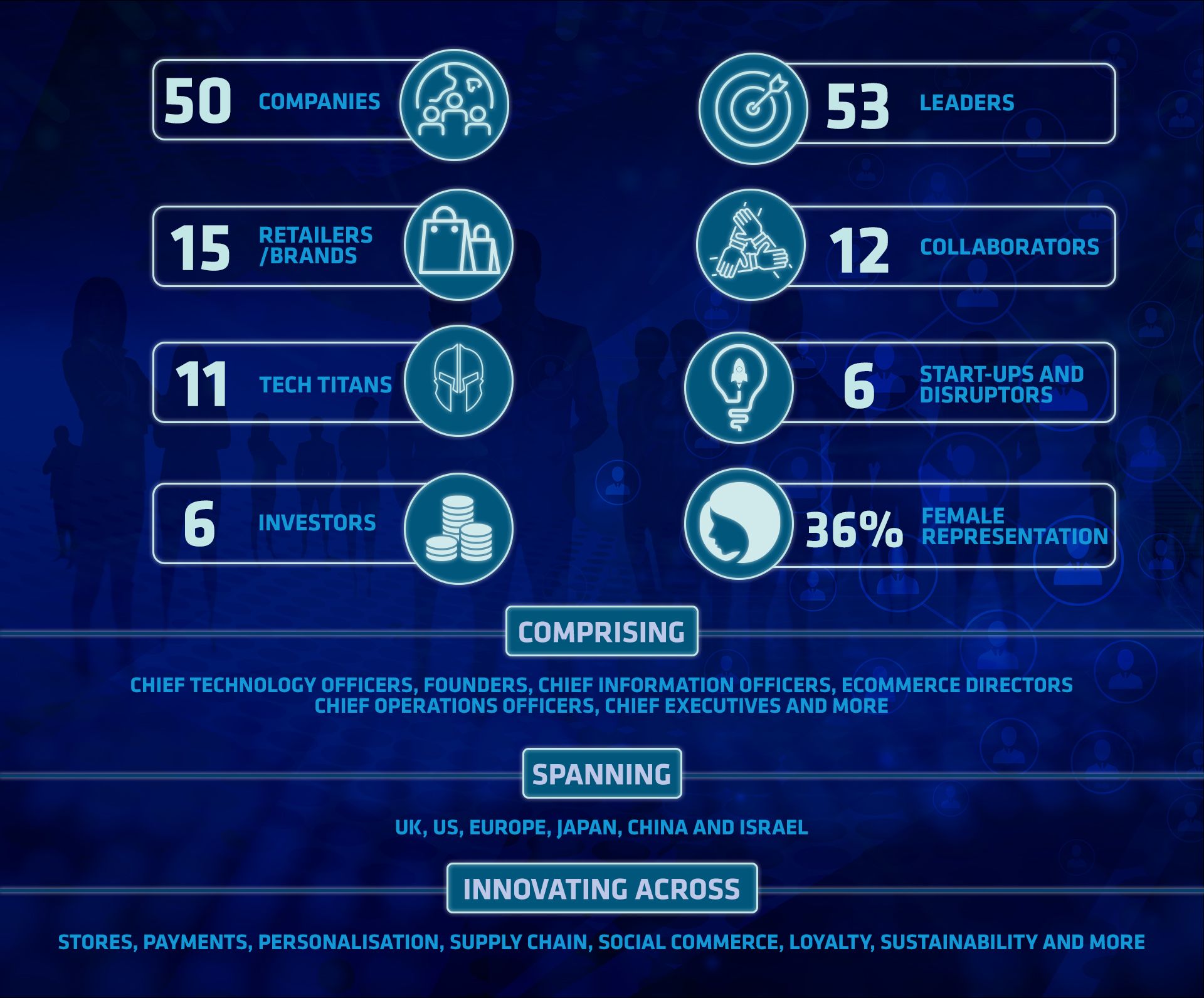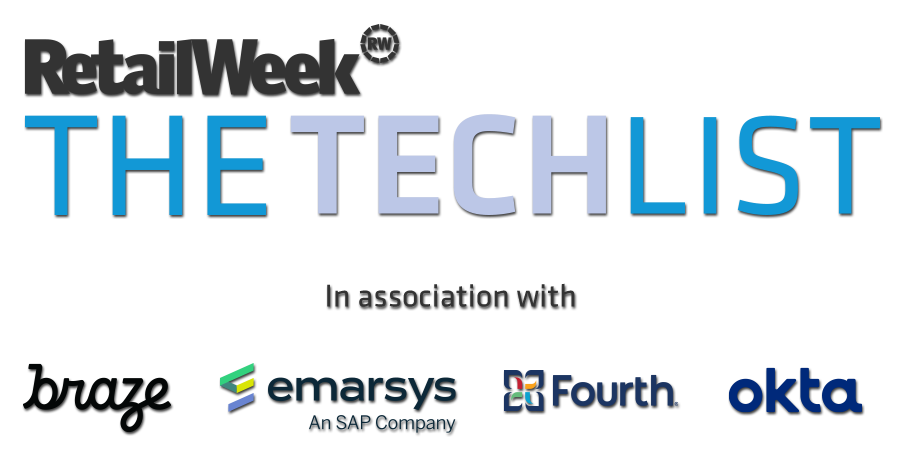
50 DIGITAL LEADERS DRIVING RETAIL INNOVATION

Retail Week presents The Tech List
Whether automating warehouses, operating cashless stores or designing metaverse inventory, in 2022 there is no doubt that retailers are innovating at pace.
For some, transformation has been necessity driven as pressures have mounted against rising inflation, the energy crisis and supply chain disruption from the sustained fallout from Brexit and the Ukraine war.
For others, largely those with bigger budgets, digital investments have been opportunity driven as a means to remain ahead of the curve and at the cutting edge of what is possible.
It is this combination of people disrupting the retail landscape to both survive and stay ahead of the game that we recognise in The Tech List.
Retail Week’s definitive index of the 50 most influential leaders in digital retail, The Tech List spans Start-ups & Disruptors, Collaborators, Investors, Retailers & Brands and Tech Titans.
Formerly known as The Tech 100, the annual index has rebranded for 2022 to become a more selective and exclusive celebration of the individuals progressing innovation worldwide.
Formerly known as The Tech 100, the annual index has rebranded for 2022 to become a more selective and exclusive celebration of the individuals progressing innovation worldwide
This includes global leaders powering retail tech trends such as in-store advancements, payments innovations, sustainability solutions, supply chain automation, Web 3.0, staff engagement, customer loyalty and social commerce.
Fresh for 2022, The Tech List has not only been compiled by Retail Week’s team of esteemed journalists, but also incorporates recommendations from industry experts such as marketing effectiveness experts WARC, retail analyst Natalie Berg and consumer-focused investment and innovation firm True.
Their insights have come together to create a list that champions those individuals achieving demonstrable success driving technological change and innovation in their fields – and shaping retail as a result.
Read on to discover the 50 digital leaders you should be working with, taking inspiration from and investing in.
THE TECH LIST – READ YOUR WAY
You can view The Tech List in its entirety with grid profiles by scrolling through The Tech List in full. Alternatively, if you only want to view specific groups or individual profiles, then you can view these singularly by selecting The Tech List by group.

In numbers


The Tech List

START-UPS & DISRUPTORS
Petri Alava
Chief executive
Infinited Fiber Company
Every fashion retailer wants to improve their eco credentials while finding a way to continue to produce large volumes of clothing in a manner that does less damage to the environment – all while protecting margins. Petri Alava’s business has the potential to help solve this conundrum. Finnish-based Infinited Fiber Company, co-founded by Alava in 2016, has developed a breakthrough recycling technique that creates a cotton replacement made from cellulose. The technology uses old cotton clothes – as well as other forms of cellulose, such as cardboard – to create an innovative thread for manufacturing clothing called Infinna. This results in a reduction in the use of virgin cotton and the significant resources, including water and land, it takes to grow this cotton. Alava is facing a favourable problem in how to scale operations fast enough to meet considerable demand. In a July 2021 funding round, the company raised $30m (£26.7m) from investors including Adidas, Bestseller and lead investor H&M. Patagonia signed up for a multi-year deal in June 2021, Zalando joined its investors in September 2021, and Ganni and Tommy Hilfiger both released Infinna items in August this year. In May, Inditex signed a three-year deal worth €100m (£87m) to buy 30% of IFC’s annual future production volume of Infinna in a move that Alava described as “significant” for its plans to build its first large-capacity factory.
TECH TITANS
David Baszucki
Co-founder and chief executive
Roblox
How can retailers engage consumers in the metaverse? David Baszucki is the person to ask. His social immersive gaming environment Roblox was released in 2006 and now counts 47 million daily active users globally, with more than half of American children reportedly playing regularly. Retailers such as Forever 21 have flocked to experiment, with the young fashion brand creating the game Shop City in December 2021, which allows users to own and operate a store. Players curate clothing dubbed ‘MetaMerch’ and the retailer marked the launch with a corresponding clothing collection on its website. Nike is an early adopter too, partnering with Roblox in November 2021 on Nikeland – a Nike-branded gaming space that allows users to buy virtual goods. Nike reported in September that 21 million people had visited Nikeland. Fashion stylists are launching in the Roblox metaverse too – respected designer Gemma Sheppard was named as Roblox’s first metaverse fashion consultant last year. While retailers and brands are experimenting with metaverse technology, more to test and learn than as a sales channel, Roblox is providing a space for retailers to get to grips with it and seize the opportunity. Baszucki has created one of the metaverse’s biggest success stories – the industry will be looking to him to understand what works in this environment and what doesn’t.
RETAILERS & BRANDS
Daniel Bay
Vice-president of global technology innovation
Nike
It is no surprise to see a leader from Nike on this list – the sportswear giant reports a seemingly never-ending stream of innovations as it shifts to meet consumer needs. As vice-president of global technology innovation, Daniel Bay is leading this having spent decades delivering consumer-facing innovations. His career has included a stint on the Amazon Alexa founding team and as head of global reach at Netflix. Now, he is bringing this experience to bear on Nike’s innovation strategy. Personalisation, customer experience and in-store innovation are his three key areas of focus, with Nike’s app ecosystem forming the nucleus – the app drives almost half of digital demand. Under Bay, Nike’s stores are also increasingly digitally driven. The House of Innovation, Nike Live and Nike Rise store formats all focus on personalisation. Nike Rise, for instance, which opened its first store in London in July, includes innovations such as the Inside Track Table, an interactive comparison tool that offers consumers immediate access to information on any pair of Nike shoes. In November 2021, Nike joined forces with online gaming platform Roblox to create a metaverse space – Nikeland – offering a digital environment “for Nike fans to connect, create, share experiences and compete”. A physical presence complements the metaverse space – an immersive world in its Nike House of Innovation store in New York with an AR Snapchat lens.
START-UPS & DISRUPTORS
Grace Beverley
Founder and chief executive
TALA & Shreddy
Grace Beverley is Gen Z’s favourite fitness influencer and digital entrepreneur. At just 25, Beverley is already spearheading a growing direct-to-consumer empire supported by her formidable social media base, which includes 1 million Instagram followers and 1.7 million TikTok likes. Her two brands, Shreddy and Tala, are going from strength to strength. Fitness platform Shreddy was started when Beverley was 19, still at university and involved the sale of PDF fitness plans via a Shopify-built site. It’s now a market-leading fitness app, which also sells supplements and fitness kits. Sustainable activewear brand Tala was founded in 2019, and in February Beverley raised $5.7m (£5m) in seed funding from investors including Rapha founder Simon Mottram, Deciem chief executive Nicola Milner and UK venture capital firm Venrex. Beverley said the money would be used to continue Tala’s disruption of the activewear industry, and will be spent on inventory, hiring and international growth. Such investment appetite is not surprising – Tala can generate more than £400,000 worth of sales within hours of a product launch just by Beverley posting on her social media channels. Sustainability and transparency is a focus for Beverley too – social media followers are taken on video tours of its factories in Italy, China and Portugal. Beverley’s innate understanding of digital brand building and what her customer wants has stood her in good stead.
TECH TITANS
Mark den Butter
Chief operations officer
JD.com and Ochama
Chinese ecommerce goliath JD.com is known for its technological and logistical prowess – it offers home deliveries via drone and autonomous vehicles, uses advanced AI-powered marketing and in recent years has opened a number of 7Fresh grocery stores in China where shoppers can choose to pay via facial recognition. Its first physical stores in Europe, which Mark den Butter is heading up the operations for alongside Ochama general manager Pass Lei, do not disappoint either. Den Butter has only been at JD.com since October 2021, following a career in Dutch supermarket chains such as Jumbo. In January, he led the opening of two robotic shops in the Netherlands under the brand name Ochama – a combination of the words ‘omnichannel’ and ‘amazing’ – with more locations set to follow. Shoppers can use an app to purchase both food and non-food items at home or on the move, before heading to the store to pick them up. The automated warehouse is partly visible to customers and forms part of the experience. Once they arrive, shoppers can scan a QR code and watch as a fleet of robots pick, sort and transfer their items via a conveyor belt. Home delivery is also available and there is a showroom with items on display. With JD eyeing other markets in Europe as it monitors the performance of these new outlets, den Butter will remain at the helm of a potentially game-changing project for omnichannel retail.
COLLABORATORS
Tessa Clarke and Saasha Celestial-One
Co-founders
Olio
Tessa Clarke and Saasha Celestial-One have a wide range of retail experience between them. Clarke – a former Retail Week publishing director – enjoyed a stint as ecommerce director at Dyson, while Celestial-One is a former American Express VP of business development. After bonding over childhoods involving farming and reusing waste, the pair brought their varied backgrounds together to create Olio, the app designed to reduce food waste created by retailers via peer-to-peer sharing. Their business has taken further steps to strengthen ties with retailers during the past 12 months. Most notable was its announcement in July of a partnership with Iceland, with 1,000 stores set to redistribute their surplus food via the app over the coming nine months. The partnership marks Olio’s first with a frozen food retailer. Meanwhile, Tesco and Pret a Manger, among others, joined forces with Olio and food bank charity FareShare to redistribute 200 million free meals by the end of 2022. While most food waste occurs at the consumer level, Olio has been keen to work with retailers to reduce their daily surplus and supermarkets have been keen to sign up. As carbon neutrality and other environmental goals increase in importance for retailers, apps such as Clarke’s and Celestial-One’s will only keep growing in importance.
TECH TITANS
Shou Zi Chew
Chief executive
TikTok
Shou Zi Chew is a tech heavyweight. In his previous job as chief financial officer at Chinese smartphone giant Xiaomi, Zi Chew helped secure crucial financing to lead the company through a 2018 public listing that would become one of the nation’s largest ever tech IPOs. Zi Chew then joined TikTok as chief executive in May 2021 and it has been an exciting year at the helm. In September 2021, Zi Chew oversaw the launch of new social commerce features under the name of TikTok Shopping, building off pilots with brands including Levi’s and Walmart as well as a partnership with Shopify. The tools allow brands to add product links, targeted ads and live shopping to tap into popular influencer content on the app such as unboxing and haul videos – where multiple items purchased by the creator are presented. Food and recipes are a huge part of TikTok’s success – #FoodTok has attracted 26 billion views to date. In August, TikTok launched a food offer, allowing users to purchase food items directly from brands including Pasta Evangelists, The Veg Box Company and The Fish Society. While reports in July suggested the app had abandoned its live shopping expansion in Europe, it remains huge in Asia and may yet g
INVESTORS
Isabela Chick
Chief strategy officer
Founders Factory
As chief strategy officer at start-up accelerator Founders Factory, it is fair to say that Isabela Chick has her finger on the pulse of what’s coming next for digital retail. Not only that but Chick, the former global head of business innovation at Telefónica, is working with retailers to help them make that vision of the future a reality. In April, this involved helping to broker a partnership between Marks & Spencer and Dotte, a peer-to-peer second-hand platform for children’s clothes. Founders Factory has invested in the marketplace, which was founded in 2020 and carries 16 smaller independent labels in addition to more than 400 M&S product listings. The move followed M&S’ 2021 partnership with rental platform Hirestreet, another business Founders Factory has invested in. Sustainability is a running theme for Chick at Founders Factory. In June, the business teamed up with Sky Ocean Ventures to launch a fund backing early-stage start-ups in the sustainable tech space. It will focus on areas such as decarbonisation, resource preservation, climate resilience and the circular economy, and in addition to money, will also offer start-ups hands-on support and access to the Founders Factory network. With these projects ahead of her, Chick is likely to stay at the forefront of retail innovation.
RETAILERS & BRANDS
Cliff Cohen
Chief technology officer
Asos
As Asos chief technology officer, Cliff Cohen holds a high-profile place in retail’s technology landscape. Cohen has been at Asos since 2015, initially joining as chief information officer after eight years at Marks & Spencer and 12 years on Accenture’s retail team. At the online behemoth, he is responsible for driving its technology strategy, delivery and operations globally, including all online customer experience, data platforms, operational and internal business systems. He has overseen the rebuilding of its core customer experience platforms, and the transformation of core operational and business systems from the retailer’s original legacy platforms. More recently, the brand has been making headway in AI innovation, using the tech to support personalised product recommendations, size assistance, efficient markdowns and price optimisation. Alongside AI, Cohen has led the development of Asos’ Partner Fulfils programme, which forms part of the retailer's wider strategic plans. This approach is driving results – in the year to August 31 2021 Asos’ active customer base grew 13% to 26.4 million. While Asos has swung into the red with an operating loss of £9.8m in the year to August 31 2022, Cohen is helping chief executive José Antonio Ramos Calamonte to revitalise the retailer in the face of macroeconomic headwinds, and this is underpinned by tech investment. Its Tech Hub in Belfast, operational as of March, involved a £14m investment and will create 184 jobs in functions including engineering and data science – the Hub forms part of Cohen’s wider strategic plan to support the continued expansion of the brand and adds to his 1,000-strong team.
INVESTORS
Alliott Cole
Co-chief executive
Octopus Ventures
Alliottt Cole is at the helm of one of the UK’s leading venture capital firms – Octopus Ventures. Cole has overseen the business since 2017, shaping Octopus into one of Europe’s largest and most active investors – it now boasts more than £1.3bn under management with investments in 130 businesses. Cole’s ability to spot retail's next big thing is renowned, with its portfolio including a plethora of big names from the world of ecommerce and digital retail, ranging from holiday travel site Secret Escapes to pet insurance disruptor ManyPets.com. Investing in the future of the circular economy is also a priority for Cole. In December 2021, Octopus led a $5.4m (£4.8m) seed funding round in fashion rental platform Hurr. Octopus highlighted not only its position in the sector, but also its ability to shift into a hybrid business model. Competing with the likes of Zoa Rental, Hurr has a solution that enables other brands and retailers to introduce rental into their business model as a white-label or managed service. This investment follows the backing of other circular leaders including peer-to-peer resale site Depop – which it first backed in 2017 and then benefited from its sale to Etsy – alongside food-sharing app Olio in September 2021 and toy subscription service Whirli in December 2020. The remainder of this year and 2023 is likely to spell more of the same after Cole unveiled the launch of a £10m pre-seed fund in June to support “tomorrow’s leading brands”.
TECH TITANS
Trudy Dai
President of core domestic ecommerce
Alibaba Group
Trudy Dai is one of Alibaba’s 18 founding members and has been at the company since 1999. Widely seen as a protege of former chief executive Jack Ma, since January Dai has taken on the leadership of the company’s domestic ecommerce arm, including Taobao, Tmall and 1688.com. Under Dai’s leadership, Alibaba’s reputation for innovation continues and this extends to metaverse technology. In the summer, in time for China’s 618 shopping festival, her B2C Taobao business launched a virtual metaverse mall. The ‘mall’ allows shoppers access via their phones – without virtual reality headsets – and enables the user to guide their avatar through 3D stores and engage in a number of interactive activities including making purchases. In June, Alibaba joined other tech titans including Meta, Microsoft and Sony to form the Metaverse Standards Forum, aimed at fostering industry-wide cooperation of interoperability standards needed to build the open metaverse. In March, meanwhile, Alibaba led a $60m (£53m) investment round into augmented reality glasses maker Nreal. The investment will be used to increase research and development, while accelerating expansion of the devices into new markets. While Alibaba has faced similar challenges to many others this year – in August sales flatlined for the first time in its history – Dai’s leadership of the ecommerce evolution continues to set the bar.
INVESTORS
Martin Davis
Chief executive
Molten Ventures
Molten Ventures floated in July 2021, making it the largest technology-focused venture capital firm on the FTSE 250. The company (rebranded from Draper Esprit last November) doesn’t generally invest in retailers – although it did invest £25m in used car marketplace Cazoo in 2020 – but instead focuses on businesses that develop the systems and infrastructure retailers rely on for their digital capabilities and day-to-day operations. Martin Davis’ strategy has led to a market cap of around £1.3bn, with investments in companies such as ratings platform Trustpilot, financial app Revolut and cloud-payment process firm Form3 – all used by leading retailers. Looking forward, while Molten is clearly in a strong position, there are potential challenges ahead. In June, Davis said investment over the coming 12 months is likely to be about half of the previous year as high inflation and rising interest rates bite. The firm is expecting to part with around £100-150m and its confidence in new investments will need to be rock solid. As with most other investors, climate change and sustainability are high on the agenda – in July, Molten led a £15m seed funding round in carbon accounting start-up Altruistiq.
RETAILERS & BRANDS
Guus Dekkers
Chief technology officer
Tesco
Guus Dekkers has quite the remit at Tesco. Having joined in 2018, he is responsible for both consumer-facing and enterprise technologies, spanning stores, supply chain and digital. During the pandemic, Dekkers’ team was responsible for handling a huge surge in online orders as consumers flocked to digital channels. Since then, he's been investing in the evolution of Tesco stores as consumers have returned. Dekkers led Tesco’s 2020 partnership with AI company Trigo (among the Start-ups and Disruptors) and has since launched a London trial of the checkoutless store tech – its first GetGo site opening in 2021 in High Holborn, with a second site set to launch in Chiswell Street this year. It frames Dekkers and Tesco’s bet on frictionless checkout technology and – as we’ve seen from others in the Tech List – drive to offer greater convenience. Other initiatives Dekkers has worked on this year have included a continued roll-out of robotics to automate its warehouses and further investment in the infrastructure required to electrify its vehicle fleet. The retailer is also exploring applications of the Internet of Things – for example, in ensuring optimal availability of products in store – and is trialling robot deliveries in partnership with Starship Technologies. Alongside other grocers it is also trialling a digital recycling initiative, paying customers 10p in coupons via an app for returning empty containers. In May 2021, Dekkers was appointed to Tesco’s executive committee, highlighting his role in shaping the future of grocery retail.
RETAILERS & BRANDS
Sandrine Deveaux
Executive vice-president, future retail
Farfetch
Farfetch has long pushed the boundaries of digital retailing and the luxury ecommerce platform continues to constantly question the way things are done. Sandrine Deveaux is driving much of this curiosity-driven approach, having been at the retailer since 2015 with a responsibility for exploring future growth opportunities. These growth avenues include focusing on strategic partnerships, the convergence of online and offline, and creating new digital experiences in the virtual world. In April 2022, Farfetch announced a global strategic partnership with Neiman Marcus Group to digitally transform its business. Through the partnership, Farfetch Platform Solutions will re-platform the Bergdorf Goodman website and mobile app; Neiman Marcus will use select Farfetch Platform Solutions modules; and both Bergdorf Goodman and Neiman Marcus will join the Farfetch Marketplace. In store, Deveaux and Farfetch are doubling down on personalisation. In April 2021, Farfetch-owned luxury boutique Browns opened its new flagship store in London’s Mayfair, featuring in-store technology such as connected mirrors, augmented reality virtual try-on tools and innovative payment solutions. Data gathered in store is used to understand what works, adapting the tech used according to location. The goal throughout is to link online and offline, augment the in-store experience and personalise each shopper’s visit.
TECH TITANS
Sophia Dominguez
Head of AR platform partnerships
Snap
As head of AR platform partnerships at Snap, Sophia Dominguez is responsible for working with a network of 250,000 developers to deliver the social media firm’s vision of retail’s future. Not only does Dominguez ensure developers have the tools they need, but she helps them see what is possible. In retail, this means developing augmented-reality-enhanced forms of physical shopping. In August, for instance, the company launched a slew of new shopping features for its social messaging app. These include AR shopping ‘lenses’ that enable platform users to virtually ‘try on’ clothes and accessories from brands including Puma, Mac, Dior and Prada. Shoppers take full body photos in any outfit and Snapchat will apply the image of the outfit they want to try on to their body. It means people will be able to try on items without visiting stores – which, if take-up is high enough, could help reduce return rates. Shoppers can also purchase then and there from the brand’s website if they want to. Via services like this, Dominguez is working to expand the ways AR can be applied, with a focus on the real world rather than the metaverse. Snap is particularly interested in the ways AR can be more useful – whether that means educational or performing practical uses.
COLLABORATORS
Jennifer Drury and Dan O’Connell
Co-founders
BrandLab360
The metaverse has been positioned by many as the future of retail, and several key players are emerging within the space as leaders and innovators. Jennifer Drury and Dan O’Connell are two such individuals. Their business BrandLab360 specialises in creating immersive virtual commerce experiences, and engaging and impactful online journeys. Launched in 2016, the company is one of the earliest adopters of metaverse-style tech, and works with a range of brands to elevate their ecommerce offer by incorporating virtual reality elements and gamification. In January it partnered with Estée Lauder beauty brand Too Faced, for instance, allowing shoppers to browse and purchase products in its virtual world ‘Maison Too Faced’ and offering games that customers could play to win product discount codes. In August, Drury and O’Connell launched what it claimed was a ‘Metaverse first’ with celebrity chef Jean-Christophe Novelli – a live and interactive cooking demo in the agency’s virtual world ‘MetaTown’ allowed consumers to interact with Novelli as avatars. MetaTown’s commercial potential is particularly interesting – retailers are able to rent space in the town to showcase their products. Shoppers can engage and buy items in the virtual stores, via their digital avatars, while socialising in the stores with their friends.
COLLABORATORS
Michael Gabay
Co-founder and chief executive
Trigo
Michael Gabay’s Israeli start-up Trigo has been making waves with its touch-free checkout operation. Founding Trigo in 2018 alongside his brother Daniel, Gabay has raised more than $100m (£89m) investment for his business, which specialises in technology to transform c-stores and supermarkets into autonomous digital shops – allowing retailers to experiment with tech that may otherwise only be open to the likes of Amazon. Trigo’s solution works by enabling shoppers to use an app to scan a QR code as they enter a store, its cameras then tag them anonymously and follow them around the store, automatically detecting when the customer has picked up an item. The system then compiles all items into a virtual shopping list with payment taken digitally. Gabay’s solution has captured retailer attention. Aldi Nord has worked with Trigo in Germany, while in the US Trigo signed a deal in January with retailer-owned cooperative Wakefern Food Corp. In the UK, Trigo’s technology is behind Tesco’s trial of autonomous stores, with the first GetGo store having opened in High Holborn, London, last year. Frictionless stores are in their relative infancy, but with Amazon’s autonomous stores having the potential to drive demand among consumers, Trigo represents an opportunity to compete with the etail giant and trial the tech in its early days. The future success of frictionless stores is far from guaranteed though, as Amazon’s recent pause shows.
RETAILERS & BRANDS
Andy Gamble
Chief information officer
Currys
Having joined Currys in June 2020 after stints as chief information officer at Dyson and Sony, Andy Gamble is leading the retailer’s ongoing digital transformation. The work is paying dividends, with Currys making headway in tech integration alongside rapid delivery – its 30-minute delivery service with Uber – and collection to bridge online and offline retailing. Its video call service ShopLive – launched during the pandemic and built in a mere six weeks – connects customers to a video chat with a tech expert. Overseen by Gamble, the initiative has already taken 4 million calls from shoppers. Getting closer to the consumer in that manner is key for Gamble. In June 2022, Currys announced a wide-ranging partnership with Salesforce to help it drive a single, 360-degree cross-channel view of every customer. The partnership is a key step in the retailer’s journey to becoming more data-driven, moving away from selling items to anonymous customers in stores to holding multichannel customer relationships for life. Plus, in a bid to reduce electronic waste, Currys has launched a scheme enabling free recycling of any electronics in stores. Delivery staff will also take old items away for recycling when delivering new appliances.
RETAILERS & BRANDS
Matt Grest
Chief information officer
The Very Group
With Matt Grest at the helm of its tech operation, former catalogue retailer The Very Group is continuing to make a name for itself in ecommerce. Grest joined Very in November 2020 having previously led a 400-strong team at the BBC overseeing its digital platforms. He is now steering Very’s tech team with the overarching goal of improving the use of data to understand customers better and to personalise the online shopping experience. This has extended to Very’s AI-driven chatbot assistant – which Grest helped develop following its initial launch during the 2020 pandemic – and now deals with around 65,000 queries a week. The chatbot has been both a commercial success in engaging customers and has also helped cut staff costs, which have then been reinvested in training to deal with more complex customer queries. Logistics automation is also a focus. At the retailer’s state-of-the-art Skygate distribution facility, orders can now be dispatched in as little as 16 minutes of being received. In October 2021 Very started trialling stockless fulfilment with Adidas and Reebok, with the sportswear brands fulfilling some orders direct to customers, allowing Very to increase its assortment. The model has since been rolled out to a range of other brands. More tech initiatives are in the pipeline too – Grest and his team are working on a loyalty proposition for highly engaged customers to increase retention.
COLLABORATORS
Karoline Gross
Founder and chief executive
Smartzer
Karoline Gross’ business has emerged as one of the most exciting tech firms for retailers looking to reach shoppers in the places they now occupy. Gross founded Smartzer in 2012, creating a service to make online videos shoppable and interactive. She has since collected an impressive list of retail clients including Dior, Marks & Spencer and Barbour, and her company has expanded its services to shoppable livestreaming. Smartzer’s tech has been used for everything from in-store selling to email newsletters. Harvey Nichols, for example, has leveraged Smartzer to roll out full-length touchscreens in store to enable customers to tap on products for more information, and buy either immediately or via a QR code. Dior used the shoppable video solution in its 2021 Christmas newsletters, and back in 2019 Missoni used Smartzer technology to make the products in its Adidas collaboration shoppable across its ecommerce website and Instagram channel. Gross said the engagement rate for the project was 38% and click-through rate (CTR) was 15% – for comparison, average CTR from Instagram ads is 0.58%. Smartzer is not just helping retailers to make social channels more profitable, it is buying into the experiential retail trend making shopping – be it offline or online – more fun and interactive. As retailers and brands seek innovative ways to capture spend and loyalty of cash-strapped consumers, Gross and her business stand in good stead.
START-UPS & DISRUPTORS
Steve Gu and Ying Zheng
Co-founders
AiFi
Between them husband-and-wife duo Steve Gu and Ying Zheng have two computer science PhDs and have held roles at tech titans including Google and Apple. The pair have put their backgrounds to good use with AiFi, the cashier-free store technology business. The AI specialists are working with a wide range of retailers globally – from Aldi and Morrisons in the UK, to supermarket chain Carrefour and convenience stores at the University of Denver in the US – to test and trial the technology. Significantly, AiFi’s store fit-outs do not require sensors or scales on the shelves to note when a product has been picked up – which is a different approach to Amazon’s Just Walk Out technology which uses sensors. Instead, cameras are pointed at products from several different directions and AI is used to determine what has been picked up by customers who are tracked as anonymous avatars. At the till, shoppers confirm what they have in their baskets and pay – there is no need to take items out of their basket or bag. Aldi opened its first AiFi-enabled Shop&Go store on London’s Greenwich High Street in January, following Morrisons’ lead of trialling the technology at its Bradford head office back in May 2021. While Gu and Zheng’s business is up against fellow Tech List entrants Trigo and Amazon Just Walk Out in a competitive market, cashless stores are yet to be proven in terms of mainstream adoption so the opportunity is there for the taking.
START-UPS & DISRUPTORS
Thibaud Hug de Larauze
Co-founder and chief executive
Back Market
Despite the cost-of-living crisis looming large, sustainability is not going anywhere in the minds of companies and consumers – and Frenchman Thibaud Hug de Larauze is making sure it remains central with a mission to make restored devices mainstream. Founded in 2014, Back Market is a marketplace for refurbished technology, allowing consumers in 15 countries to buy like-new laptops and smartphones for a fraction of their usual price. Hug de Larauze’s business is attracting plenty of attention – from investors and customers. In May 2021, he completed a Series D funding round of $335m (£298m) led by General Atlantic, which boosted the company’s value to $5.7bn (£5bn) – 3.5 times more than its 2020 level. The investment marked the largest UK retail start-up funding round of 2021, according to private market data platform PitchBook. Much of the money is going into growing the team – at the time of writing, the company had 109 jobs advertised just in its technology department alone. Partnerships are also on the agenda for Hug de Larauze; in April Back Market signed a deal with refurbished tech specialist MusicMagpie to sell consumer electronic products in both the UK and US. In addition to mobile phones, the agreement includes technology such as games consoles, tablets, wearables and MacBooks Hug de Larauze says his goal is to join forces to expand the size of the market – Back Market’s success so far suggests they have the capability to do just that.
TECH TITANS
Andy Jassy
President and chief executive
Amazon
Andy Jassy is an Amazon veteran – he joined the company in 1997 and held a range of positions – including founding and leading Amazon Web Services (AWS) from 2016 to 2021 – before becoming chief executive in 2021. It has been a rollercoaster start to his CEO tenure – in April, the etail titan posted its first loss since 2015 as challenging trading conditions took their toll. In August, reports suggested the company had also paused the rollout of its checkout-free grocery store format in the UK, for at least a year, following disappointing sales. However, Jassy pointed out that the consumer business had still grown 23% annually over the past two years. The focus for Jassy now is improving productivity and cost efficiencies in its fulfilment network and innovating in other areas. In May Amazon opened its first ever fashion store in California. Shoppers use the Amazon app to check for sizes and colours, as well as unlock fitting rooms, and the data from their shopping experience supports personalised recommendations. In July, meanwhile, Jassy revealed a new fleet of e-cargo bikes and on-foot delivery staff to replace van deliveries in London, alongside an electric fleet of HGVs in March, as part of broader plans to become net-zero by 2040. Amazon has also thrown down the gauntlet to Tesco on prices, stating in July it would match the supermarket in a cost-of-living showdown. One thing is certain with Amazon under Jassy – retail is never boring.
COLLABORATORS
Luke Jensen
Chief executive
Ocado Solutions
Having led Ocado’s technology arm Ocado Solutions for six years, Luke Jensen has played a consistently significant role in determining the future of grocery innovation. Ocado’s technology has long been its USP and during 2022 the grocer has stepped things up a gear. In January, it announced a range of seven innovations under its Ocado Re:Imagined programme, which represented the biggest step forward for the business since it started selling its software and hardware to other retailers in 2014. One was the new 600 Series bot, which the company described as the “lightest and most efficient” grocery fulfilment robot in the world. The lighter grid requirements of the robots mean an Ocado fulfilment centre, which currently takes up to two years to fit out, could now go from zero to fully operational in six months. The grocer’s physical technologies all feed into Ocado’s more holistic announcements such as Ocado Orbit. Billed as the “world’s first virtual distribution centre”, Ocado Orbit will allow all warehouse sites to offer the entire combined range of the network, allowing consumers to have “access to thousands of products, but with shorter lead times”. The final innovation was Ocado Flex, new software that lets Ocado partners integrate their existing websites and apps into Ocado Smart Platform (OSP) technology.
COLLABORATORS
Sergey Klimentyev
Co-founder
Texel
Return rates continue to plague retailers’ bottom lines and for fashion in particular. In Texel, Sergey Klimentyev has built a solution to help mitigate the problem for retailers and consumers alike. Founded in Kazakhstan in 2014, Texel offers a virtual try-on and size advice widget. Klimentyev and his team develop and manufacture solutions that enable precise 3D measurement of a human body, while the Texel Portal is an award-winning full-colour 3D body scanner. Consumers can create digital avatars using the scanning technology, while the business also operates a free B2C product that allows users to try on a digital garment when supplying a photo of themselves. Although it remains in the early adoption stage, Marks & Spencer has trialled the technology and found that customers using the tool were five times more likely to purchase and 30% less likely to return items. The commercial potential is vast – reports from last year show that 87% of global retail returns are due to incorrect sizing, therefore global body-scanning technology can eliminate the ambiguity of fit and lead to further reductions in customer refunds. This potential was recognised in May at the Retail Week Live conference, when Texel was crowned the winner of the Discovery Stage – a pitch competition where 30 start-ups compete to appear at the event, gaining access to key retail contacts as a result. Visualisation tech is a tough nut to crack, but if Texel can succeed it could overhaul online fashion.
RETAILERS & BRANDS
Naho Kono
Executive vice-president and chief marketing officer
Rakuten Group
Celebrating its 25th anniversary this year, Rakuten holds a central place in the ecommerce landscape and Naho Kono plays a key role in the firm’s online leadership in Japan. Having joined Rakuten in 2003, Kono is the first female – and youngest ever – managing executive officer at the retailer. She also serves as chief marketing officer of Rakuten Group and Rakuten Mobile – its new mobile carrier business launched in 2020. Under Kono, Rakuten has built an impressive digital ecosystem that links all aspects of online through to payments. Its loyalty programme – and the data it generates – is now at the heart of its offer and is used in a network of 5 million partner store locations across Japan. Speaking at World Retail Congress in March, Kono said its partner ecosystem is continuing to grow, with consumers able to spend their loyalty points at local convenience and drug stores, as well as supermarket chains such as former Walmart subsidiary Seiyu. Its online marketplace is at the centre, with increased loyalty leading to 75% of customers making a repeat purchase within a three-month period. To get closer to consumers, the business is also experimenting with drones and autonomous delivery vehicles. As the largest ecommerce site in Japan with a market cap of $7.25bn (£6.5bn) and annual sales of over ¥1.68trn (£10.48bn), Kono’s work at Rakuten offers a window into an innovative model for the future of digital retail.
RETAILERS & BRANDS
Suresh Kumar
Global chief technology officer and chief development officer
Walmart
There is seemingly no end to the technology projects Walmart is investing in under global chief technology officer Suresh Kumar, a former executive of tech titans Google and Microsoft. In May, the US retailer announced its drone delivery service catering to 4 million US households, with the service rolling out to six US states by the end of the year. Delivery and the last mile is clearly a priority: in July 2022, Kumar unveiled the purchase of 4,500 electric delivery vehicles, part of its work to achieve net-zero emissions by 2040. Its advanced InHome delivery scheme, meanwhile, allows delivery staff to put shoppers’ groceries away for them inside their homes while they are out. However, it is not all forward-thinking, final-mile solutions and tech for tech’s sake – this innovation is being matched by savvy back-end supply chain investments. Kumar reported in a February 2021 earnings call that AI had helped improve the timing of inventory markdowns, saving the company $30m (£27m). And in August this year, the company credited automation and augmented reality technology VizPick with improving inventory management in its US stores, enabling staff to move products from the stockroom to the shopfloor more efficiently. The goal for Walmart is to remain one step ahead and under Kumar’s tech leadership the hypermarket giant is achieving that ambition.
TECH TITANS
Marne Levine
Chief business officer
Meta
Following a career that spans a stint in government, in the Obama administration as chief of staff of the National Economic Council; to academia, as chief of staff for then Harvard University president Larry Summers; Marne Levine joined Meta – then Facebook – as vice-president for public policy in 2010. In the years since she has led operations at Instagram and global partnerships at Facebook, before coming to her current role overseeing Meta’s advertising and business partnerships. It is an integral position given Meta’s influence in retail; interviews for our Retail 2022 report with 59 CEOs show 87% of retailers invest in advertising with the tech giant. Recent retailer partnerships headed up by Levine have included a tie-up with Balenciaga, Thom Browne and Prada to create digital outfits for avatars in June. While in November 2021 Carrefour announced it would be collaborating with Meta on a range of services including digital advertising and customer relations to make it easier for consumers to shop on their mobiles. While Levine has made exciting progress, there is a tough road ahead as current inflationary pressures will impact retailer advertising budgets. There’s also the small issue of burgeoning competitors such as TikTok vying for a piece of the digital advertising pie.
TECH TITANS
Tobias Lütke
Founder and chief executive
Shopify
Although it has been a tough year for Tobias Lütke and Shopify, the company retains its place at the heart of the ecommerce landscape. In May it reported its slowest quarterly revenue growth since going public in 2015: its first quarter rise of 22% to $1.22bn (£1.1bn) would be music to many companies’ ears, but it was a far cry from nearly 100% growth during the early days of the pandemic. Shares tumbled and the business announced it would axe 10% of its workforce. Lütke admitted to making a bet that didn’t pay off; he expected the share of dollars that travel through ecommerce instead of stores would permanently leap ahead by five or ten years – this didn't end up materialising. However, Lütke’s Shopify still provides infrastructure to a huge number of small-to-medium retailers such as Heinz, Deliveroo and Kylie Cosmetics. While revenue growth may have slowed, under his leadership the company is continuing to invest to contend with the slowdown. In August it announced a $2.1bn (£1.9bn) deal to buy US logistics firm Deliverr in a bid to improve its final-mile network. In the same month, Lütke joined a $24m (£21m) series A funding round for Thirdweb, which is developing Web3 tools. It might have been a tricky year, but Lütke is still one of the major digital players.
RETAILERS & BRANDS
Kash Mahmood
Group ecommerce, marketing and Total Platform director
Next
Next is among the major UK retailers that set the benchmark for digital and tech innovation, and Kash Mahmood is ensuring Next maintains that reputation. Having joined Next in 2016 after leaving his role as director of digital innovation at Boots, Mahmood created Next’s Total Platform, which was launched in 2020, and now oversees its growth. The platform gives other retailers the opportunity to benefit from Next’s own formidable infrastructure, expertise and software, and has become the jewel in the retailer’s crown. In its full-year results reported in March, Next boss Lord Wolfson said the platform had netted £10m profit. Providing brands with a full-service ecommerce solution – from website to warehouse – Total Platform has signed up brands including Reiss, Laura Ashley and most recently Gap. All the while, Next’s own online sales go from strength to strength – up 33% year on year in March, reaching £3.1bn, and up 44% on a three-year basis in its second-quarter results in August 2022. While annual online growth has stalled as shoppers return to stores, it remains a significant part of its future plans, including Total Platform, which Next plans to expand by working with a growing number of clothing and homewares brands on a commission basis. Some of these partnerships may also include taking an equity stake.
TECH TITANS
Jennifer Maul
General manager
Amazon Just Walk Out
Jennifer Maul has been at Amazon for eight years, leading on US commercial sales until 2021 and then stepping up to lead its third-party Just Walk Out technology business. The ecommerce giant’s Just Walk Out technology debuted in the UK to much fanfare in March 2021, opening the first store in Ealing, London. Powered by hundreds of cameras, pressure-sensor technology on the shelves and Al, Just Walk Out technology automatically detects when products are taken from or returned to the shelves and keeps track of them in a virtual cart. When a customer has finished shopping, they can just leave the store without having to stop to check out. Customers swipe a QR code on their phone through Amazon’s app to enter the store and, once they’ve finished shopping, can walk out with payment taken automatically via the app. Maul’s team wants to expand the use of the in-store tech by other retailers and to support this in August the company shifted tech teams for its physical stores from its consumer division to its AWS cloud division. Sainsbury’s was among the first to launch it in November 2021. Yet while Maul and her team's work on checkout-free stores have generated significant buzz, the journey towards mainstream adoption may be slow. In August, reports suggested Amazon had pulled out of talks on dozens of new UK sites for Fresh stores with plans for expansion having been put on ice for at least a year, excluding premises where it had already committed to a lease. Sales are said to have fallen short of expectations, exacerbated by high fit-out costs for the stores. There are undoubtedly hurdles, but retailers clearly see a future in checkout-free stores and, despite competition from agile start-ups such as Trigo (see Collaborators) and AiFi (see Start-ups and Disruptors), Maul is helping Amazon set the pace.
COLLABORATORS
Chris McShane
Director B2B operations, Halfords, and president at Avayler
One of a slew of retailers diversifying their propositions to stay relevant and generate new revenue streams, Halfords launched its B2B platform Avayler in July 2021 and tasked former Currys director Chris McShane – who founded the software business – with responsibility for scaling the solution globally. Rolled out of Halfords’ own technology that had been used to manage its retail stores, garages and mobile van fleets, Avayler brings together in-house built services and systems, and is now available to third parties looking to streamline service delivery. McShane – now Halfords director for B2B operations and Avayler president, promoted from managing director of Halfords Mobile Expert and motoring service transformation director – has been busy securing partnerships. Avayler’s first customer is American Tyre Distributors (ATD), which supplies tyres to 80,000 garages across the US – the Avayler platform will now underpin its operations. McShane also sees opportunities in other sectors outside of the motoring world such as retail and healthcare – he believes that any sector where a complex service needs to be provided, is highly regulated and that has a complex supply chain, could make use of the Avayler platform. Halfords has delivered strong performance through the pandemic, driven by its third-party services, B2B revenues and online, delivering pre-tax profits of £96.6m in the year to April 1, up from £64.5m the year before.
COLLABORATORS
Brian Millham
President and chief operating officer
Salesforce
The past 12 months has seen renewed growth for Salesforce, with a string of new retail contracts to its name. The software giant provides the infrastructure that dozens of global retailers rely on and, as president and chief operating officer, Brian Millham is overseeing the success of these retailer partnerships across all markets. A 23-year veteran of the company, Millham is credited with a key role in building Salesforce into the behemoth it is today. Salesforce’s technology helps companies achieve the all-important single consistent experience across channels and in just the past 12 months it has added two big UK names to its retail client list. Asda signed up to Salesforce’s full retail suite as it separates from former owner Walmart, including Commerce Cloud, Service Cloud and Marketing Cloud. Currys is on a similar journey, stating in June that it will be using Salesforce technology to fuel its continued omnichannel transformation. The goal for both retailers is to achieve a single, 360-degree view of every customer and to become more data-driven. Millham isn’t just expanding what the company has always done either. Also in June, Salesforce unveiled a partnership with social media giant TikTok to make it easier for its Commerce Cloud customers to engage with TikTok users. Millham says this is the latest investment to help retailers and brands reach shoppers via social channels.
RETAILERS & BRANDS
Gabriel Moneo Marina
Chief IT officer
Inditex
Gabriel Moneo Marina is another tech leader who has earned his spot on The Tech List with an imaginative approach to blended retail and tech-driven supply chain innovation. In April, Inditex-owned Zara unveiled its most tech-driven store yet in Madrid, with a focus on combining online and offline experiences. Customers can reserve fitting rooms via the Zara app, purchase using their mobiles using scan-and-go tech, browse stock in the store, and order it for click and collect within two hours. There is also an online collection point with a robotic storage area and capacity for 1,500 orders. Elsewhere in supply chain, Marina is overseeing investments to achieve a single view of stock. Its single multichannel stockroom – an RFID-enabled project started in 2012 – allows real-time inventory management and enabled the business to fulfil £1bn worth of online sales from stores in the year to 2021. Steered by Marina, Zara is focusing its appetite for tech innovation on sustainability, too. In May, the retailer signed a three-year commitment to buying €100m (£87m) worth of recycled material from Infinna (featured among the Start-ups and Disruptors), which makes a cotton-style thread from old clothes and other forms of cellulose. With Inditex focused on technology investment as a route to both digital success and a sustainable future, Marina is at the helm of a significant change operation.
START-UPS & DISRUPTORS
Evelyn Mora
Founder and chief executive
Digital Village
Evelyn Mora is one of the top new voices shaping the metaverse. Paris-based entrepreneur Mora founded Helsinki Fashion Week in 2018 and in 2020 hosted the world’s first virtual 3D fashion week, which over 500,000 people attended. Building on this engagement, Mora has sought to realise the potential for Web3 tools – third-generation web technologies such as blockchain and AI – to find alternative, sustainable business models for retailers. In 2021, Mora founded Digital Village, a platform that exists to help solve the problems and challenges faced by traditional fashion brands when transitioning into the Web3 space. It uses tools and technologies across social media, gaming and ecommerce to introduce brands to Web3, internet of things and virtual environments. It encourages brands and creators to build their own metaverses, with the future goal being a network of metaverses that users can enter and travel around using one avatar. Users of Digital Village’s services can purchase their own metaverses and NFTs (non-fungible tokens), export assets from the marketplace, and build their own environments and communities. They will then be interoperable with other metaverses that have been created in the Digital Village ecosystem. The platform only launched in September so the jury is out on the uptake, but Mora’s work in the field makes her one to watch.
TECH TITANS
Adam Mosseri
Head of Instagram
Adam Mosseri took over as head of Instagram in 2018 after the resignation of the app’s founders. Having started at Facebook in 2008 as a product designer where he led the team that developed Facebook’s news feed, under his leadership Instagram can be expected to closely follow Meta’s vision. With Instagram a central marketing channel for most retailers, Mosseri’s job has been to maintain its dominance in the face of stiff competition from burgeoning mediums such as TikTok. Instagram’s role is most crucial in marketing – it came second only to Meta as to where retailers are placing marketing spend in the Retail 2022 report, based on interviews with 59 CEOs. The app made an estimated $47.6bn (£42.4bn) in revenue in 2021 – around 50% of Meta’s total revenue. Brands such as activewear retailer Gymshark have relied almost exclusively on the app to fuel early growth. Mosseri is focused on removing friction to support these partnerships and in July helped streamline the process by launching an in-chat payment feature for retailers and brands in the US. The feature allows buyers and sellers to communicate in real time, request or collect payments and track orders directly from an Instagram chat. Advancements are not without their challenges though; Mosseri has faced criticism from those who say the app has in fact become too similar to TikTok with excessive video content and posts from non-followers.
TECH TITANS
Deirdre O’Brien
Senior vice-president of retail and people
Apple
Deidre O’Brien is Tim Cook’s right-hand woman, reporting into the Apple chief executive as she works to deliver innovative retail experiences at the tech giant. A 34-year Apple veteran, O’Brien has been named one of the world’s most powerful women in retail by Fortune and this year placed 12th on Fast Company’s inspiring Queer List. O’Brien helped to build Apple’s very first retail and ecommerce sites, work that makes her well versed in the company’s drive to use technology to connect to customers. In the past year, this has presented itself in bridging offline and online retail, particularly through tech-driven stores. Apple opened a new store in London in July with a focus on continuing to push the envelope in the ways tech can enhance the store shopping experience. The store features Apple’s first UK pick-up point where customers can order products online for collection for increased conveneince. In addition, under O’Brien’s steer, the retailer offers an augmented reality experience called United Visions at the store. Created in partnership with the Getty Museum using Apple technology, it pays homage to the works of poet William Blake through visual and audio AR. O’Brien’s aim is to create stores that serve more than just transactional purposes and as consumers’ shopping expectations increase, this will be ever more crucial in the year ahead.
RETAILERS & BRANDS
Jeremy Pee
Chief digital and data officer
Marks & Spencer
Jeremy Pee’s remit is vast – leading on technology innovation for the entire Marks & Spencer business – yet it is one he is fulfilling with aplomb, overseeing major advancements. He is leading the retailer’s MS2 division, which brings together its online, data and digital teams with the goal of challenging the way the rest of the business is thinking. So far, his efforts are paying off. Sales have soared after resource was focused on improving stock availability via in-store fulfilment, boosted delivery and collection services, and the retailer has embraced live shopping with M&S Live, a live-streamed shoppable show on the M&S website. Other recent improvements have included launching tech apprenticeships to bolster talent and an overhaul of its digital loyalty app Sparks. In 2020, Pee relaunched the card as a digital-first loyalty scheme, hosted through the M&S app; as of May this year the scheme has grown to 15 million members. Under Pee, the retailer has also boosted frictionless payments in store – it has rolled out its Scan & Shop (formerly MobilePay Go) service, which allows shoppers to pay using their smartphones and is now available across all stores. Pee’s work has helped contribute to the wider performance of the M&S business – in the 52 weeks to April 2, strong online growth drove an increase in full-price clothing and home sales of 28.5% compared to pre-pandemic levels.
RETAILERS & BRANDS
Elodie Perthuisot
Executive director, ecommerce, data and digital transformation
Carrefour
Carrefour is one of the world’s biggest retailers and, as group executive director for ecommerce, data and digital transformation, Elodie Perthuisot has a pivotal role in determining the industry’s digital direction. Perthuisot, who initially joined the French grocer as chief marketing officer in 2018, has spoken of the importance of avoiding “tech for the sake of tech”, instead focusing on solutions that tangibly improve the business such as store innovation. In November 2021, Carrefour took a gamble on a new concept store, under Perthuisot’s lead. Its Flash 10/10 convenience store in Paris was developed in collaboration with US start-up AiFi (featured among the Start-ups and Disruptors), which is focused on consumer convenience delivering ‘10 seconds to shop and 10 seconds to pay’. The store ties neatly into Carrefour’s overarching digital goals, with the chain gunning for a ‘deep transformation of traditional retail through digital’, as well as a data-first approach. This means upping its digital investment, with €3bn earmarked for 2022-26 alongside a fund backing early-stage start-ups addressing the digital space. Launched in April in partnership with venture capital firm Daphni, the Dastore fund has €80m (£70m) to invest. Perthuisot is also making headway in the virtual world – in July Carrefour announced a metaverse partnership with Procter & Gamble brand Mr Clean. Perthuisot said the activation combines gamification, immersion and Web3 to provide a route to test and feedback on the metaverse opportunity.
INVESTORS
Danny Rimer
Partner
Index Ventures
Canadian businessman Danny Rimer joined Geneva-based venture capital firm Index Ventures in 2002, establishing first the London office and later the San Francisco office with Mike Volpi. Rimer, who has an OBE for services to business and formerly served as a director at Dropbox, Sky and Skype, has helped make Index the investment house every start-up wants to land. His choices in the retail market have both led – and shown his innate understanding of – the direction of travel. Index is the main investor behind start-up darling Beauty Pie, leading a $100m (£89m) Series B funding round last September in the beauty brand Rimer described back in 2020 as having a relationship with its customers that represents the “new social contract” of ecommerce. Built on authenticity, directness, intimacy and trust rather than the traditional aspiration or flattery of older brands, it is a feature he argues is shared by his other Index investments Glossier and Farfetch, and past investments such as Etsy and Trouva – the latter was acquired by furniture etailer Made.com for an undisclosed sum in May. Index was also one of the biggest investors in metaverse social gaming platform Roblox (also featured in The Tech List) and Index collected on the biggest exit in history in September 2021 when the company went public, securing a $3.42bn (£3bn) stake.
COLLABORATORS
Adam Selipsky
Chief executive
Amazon Web Services
As tech titans go, they don’t come much bigger than Adam Selipsky. Selipsky rejoined Amazon Web Services in May 2021, having previously led its marketing, sales and support function for 11 years up until 2016. Selipsky went on to spend five years as president and chief executive of Tableau Software, leading the company through its acquisition by Salesforce. Now with his feet firmly back under the table, Selipsky is working to maintain AWS’ status as the world’s biggest cloud service provider – it already boasts a 40% share of the market and a customer base that includes Sainsbury’s, Zalando and Nike. The company is continuing to grow, with retailers attracted to the service for reasons beyond web hosting and cloud storage – many hope to get access to the same advanced data analytics technologies that have underpinned Amazon’s relentless assault on ecommerce. In June, Selipsky launched Amazon Personalize, a fully managed machine-learning service that gives retail customers access to the same AI and data-led tech used by Amazon’s own retail site, without the need for internal AI expertise. Yet growing sales isn’t the only focus for Selipsky. In September he asserted that “making profits and doing right by shareholders, and working on ways to protect the environment and mitigate climate change are not mutually exclusive”, and highlighted AWS’ emphasis on making its cloud data centres more energy efficient.
INVESTORS
Masayoshi Son
Founder, chair and chief executive
SoftBank
Billionaire Korean-Japanese technology entrepreneur Masayoshi Son is not new to retail. His most successful investment to date was his 2000 $20m (£18m) investment in Alibaba – a stake that was worth $130bn (£116bn) in 2018. No doubt looking for the next giant to match this, he has increased his focus on retail in recent years and this has never been more evident than in 2022. In February, his investment firm SoftBank increased its stake in meal kit company Gousto, leading a $230m (£205m) secondary placement. This followed a January fundraise of $150m (£134m) in primary capital for Gousto, which included a $100m (£89m) equity investment from SoftBank’s Vision Fund 2. Also in February, Softbank led a Series C funding round that raised $190m (£169m) for emerging retail investment platform PrimaryBid. The platform enables retail investors to join corporate funding events, such as IPOs, at the same time and prices as institutional investors, with the aim of democratising public market offerings and making them more inclusive. Son has made some tough decisions this year too. An agreement to acquire 20% in The Hut Group’s technology and logistics arm Ingenuity was terminated in July “by mutual agreement”, with the Hut Group blaming global macroeconomic conditions. SoftBank is clearly interested in retail innovation – and as one of the world’s biggest investors, Son is a leader to watch carefully.
RETAILERS & BRANDS
Manu Steijaert
Executive vice-president and chief customer officer
McDonald’s
As first-ever chief customer officer at McDonald’s, Manu Steijaert is helping the fast-food giant get closer to consumers with a concentrated focus on digital, data and engagement. Steijaert, promoted from chief marketing officer last year, has been actively driving growth of the McDonald’s app, which – through increased personalisation, improved in-app ordering, free food promotions and celebrity meal deals – enjoyed 33.3% more downloads in 2021 than in 2020. As of October, the app is reported to have more than 40 million registered users while McDonald's now has the MyMcDonald’s Rewards loyalty programme in 50 markets. Steijaert’s job is to take things even further. With more than half of its sales now coming through digital channels, the ultimate goal for McDonald’s is for its customers to be able to move between store, takeaway and delivery channels conveniently. In the coming year, Steijaert will prioritise further developing contactless channels such as delivery and drive-thru, and continuing to create digital experiences that are easy to use. He will also ensure that touchpoints in store are joined up with online activity; building on the business’ ‘convenience of the future’ branches, such as those launched in London in May that offer customers 11 different ways to order across mediums including digital screens, mobile, in app and traditional counters.
RETAILERS & BRANDS
Fiona Tan
Chief technology officer
Wayfair
Fiona Tan was promoted to the role of Wayfair chief technology officer in March, following two years supporting growth at the US furniture ecommerce giant in the role of global head of customer and supplier technology. Tan is no stranger to leading on world-class innovation – she served as Walmart’s senior vice-president of US technology from 2014 to 2020. Tan is now focused on building Wayfair’s “strengths as a tech organisation” – this involves driving hyper-personalisation by doubling down on social commerce and augmented stores to get closer to consumers. Back in November, Wayfair entered the world of video shopping, launching its in-app video-purchasing solution, Wayfair on Air. The daily show – targeted at making its home products more discoverable – sees presenters showcasing items with the ability for consumers to buy directly. This has been followed by the expansion of its social selling partnership with TalkShopLive – using augmented reality and virtual reality to engage customers – cementing its position at the front of the pack for retailers using this tech to improve CX. TalkShopLive works by giving consumers a digital display of what furniture will look like in their own home, supporting the purchasing process. This activity also segues into Tan’s work offline. In December 2021, Wayfair said it was opening three new stores all focused on digital – details about what will be involved were sparse, but the retailer said it would be an “innovative format that blends the best of in-store and online shopping”.
COLLABORATORS
Rachel Tipograph
Founder and chief executive
MikMak
While age is not a defining criteria for The Tech List, Rachel Tipograph’s story would make for a good contender if it were. US-based Tipograph launched her business MikMak, the ecommerce marketing analytics specialist, at the age of just 24 and has since secured retail partnerships with brands ranging from Amazon and Walmart to Tesco and Unilever. Such success gained her a spot on Forbes’ prestigious 30 under 30 list, recognition as “one of the hottest marketing tech companies of 2022” by Business Insider, and financial backing from Foursquare co-founder David Shim and Bazaarvoice founder Brett Hurt. Tipograph came up with the concept while working on ecommerce sales at Gap, where she found that promotional emails and retargeting advertising could often erode consumer loyalty. MikMak originated as a video commerce platform that would avoid messy marketing by enabling consumers to shop directly through social media. Using these insights, the company has since evolved from B2C to B2B, with software that enables retailers to track sales across different online platforms and react as a result. Retailers can see where sales are happening, which helps them double down on where to run advertising or content. With the digital space continuing to evolve, Tipograph’s business is helping retailers remain relevant and avoid unconvincing selling tactics.
INVESTORS
Matt Truman
Co-founder and executive chair
True
As a specialist investor in retail and consumer businesses, Matt Truman’s True has earned a place at the heart of the industry – driving it forward with new ideas and investments, and offering a unique source of insight into the trends affecting retail. With around £600m under management, the firm takes equity stakes in digital-first businesses that are tapping into changes in consumer behaviour. Investments include premium bedding brand Bedfolk and in-store data company Arpalus, which uses augmented reality and computer vision to improve how store data is collected and analysed. Truman has also developed an extensive network designed to foster engagement between retailers and tech start-ups. In a significant step last September, Marks & Spencer became the lead investor in a new £50m technology fund managed by True, committing more than £20m to help speed up its digital transformation. The goal is to consider long-term areas of growth, although the partnership has already produced some fruitful commercial endeavours in the short term such as bringing childrenswear brand Frugi on to its website. In another partnership with M&S, Truman launched a sustainability innovation challenge in June that aims to find tech-focused partners that will help the retailer meet its 2040 net-zero goal. The True team is working with M&S’ Ignite team – which manages open innovation at the retailer – to find ideas and technologies.
RETAILERS & BRANDS
JJ Van Oosten
Chief digital and technology officer
Kingfisher
Technology leader JJ Van Oosten is helping DIY giant Kingfisher achieve its aim of delivering frictionless retail, leading on significant omnichannel investments to make things seamless for customers. Since joining the B&Q and Screwfix owner in 2020 from Lego, Belgian national Van Oosten has wasted no time in making his mark. He has been credited with a dramatic overhaul of B&Q’s digital strategy and this extends to the launch of its first ecommerce marketplace in March.The goal is to provide more choice for shoppers with 100,000 additional products planned for the first six months via third-party sellers, tripling the previous number of SKUs; click-and-collect options are planned for these items too. Multichannel retail is also a focus for Van Oosten, with services such as speedy delivery a focus via a Gophr within-the-hour delivery service currently on trial in Bristol. Its in-store digital hubs, which fulfil orders that would previously have been sent from a distribution centre, helped ecommerce sales rise 5.3% in the year to January 31, up more than 170% on a two-year comparison. While scaling up Diy.com remains the central goal, Van Oosten is also experimenting with virtual tools. In July, Kingfisher announced it is rolling out 3D and VR planning tools online and in stores across its brands, enabling shoppers to plan their bathrooms, kitchen and storage projects.
START-UPS & DISRUPTORS
Isabella West
Founder and chief executive
Hirestreet and Zoa
As one of the pioneers of fashion rental, Isabella West’s Hirestreet is growing in popularity with the platform now boasting more than 1.8 million users. Retailers also want in; Simply Be launched a collection in August, Decathlon launched a ski and hiking collection in January, and in April Marks & Spencer introduced a range of spring/summer womenswear in its latest tie-up with the platform. This growth builds on West’s other business – Zoa Rental – which she launched in 2021 as a white-label rental-as-a-service platform enabling retailers such as French Connection to build their own rental platforms. In September, West launched Zoa rental lab, a new innovation programme that aims to define what an optimal circular commerce customer experience looks like. West’s work in the space is paying off; in July Hirestreet said it had helped its customers save £1.3m during the first half of 2022 by renting instead of buying. West has been candid about the logistical and technical challenges of rental, which is still an evolving market. In June she discussed the pilot for a newreturns programme that aims to reduce the cleaning and processing of garments that haven’t been worn by using data to identify the clothing items that are most often returned. Despite the fact that fashion rental still has a long way to go, in West there is a steady hand at the tiller.
COLLABORATORS
Alastair Westgarth
Chief executive
Starship Technologies
Alastair Westgarth has had a strong first year at the helm of robotics specialist Starship Technologies as he seeks to scale the business internationally. Joining in June 2021 from Alphabet’s Loon – the now defunct subsidiary business that offered internet access to remote areas – Westgarth has overseen the raising of $100m (£89m), expansion of retail partnerships, and increased tech investment for the company – which manufactures six-wheeled ground robots that can navigate streets and sidewalks autonomously. The funding included a new $42m (£37m) Series B funding round led by the Japanese-Nordic VC firm NordicNinjaand Estonian investors Taavet+Sten, which brought Starship’s total funding to $202m (£180m). This will help the business boost its retail presence – in July the Co-op expanded its trial of Starship’s delivery robots to Bedfordshire having successfully piloted them in Milton Keynes and Cambridge. Local governments are also said to be interested in the concept from an environmental perspective as the delivery robots have the potential to cut emissions from short car journeys. The Co-op, for instance, has highlighted that a delivery journey with Starship in Milton Keynes uses just as much energy as boiling a kettle. With the autonomous delivery robots market set to grow by nearly $25bn (£22.2bn) by 2026 – an 85% increase on the current market according to market intelligence platform ReportLinker – there is huge potential for Starship under Westgarth.
COLLABORATORS
Paul Wilkinson
Group product manager
Deliveroo
Paul Wilkinson joined Deliveroo in May. His appointment was a sign for many in the industry of the delivery firm’s intention to scale its retail presence. Wilkinson joined from Amazon’s Alexa Shopping business, where he held the role of senior product manager for two years. He also has 10 years’ experience at Tesco, including positions as head of technology research and open innovation at Tesco Labs. Now overseeing Deliveroo’s grocery partnerships, Wilkinson is intent on proving that quick commerce is here to stay and the recent stream of tie-ups he has led on supports this. In February, Waitrose signed up for Deliveroo’s Hop rapid delivery scheme – which promises to deliver within 10 minutes – and this was extended in April to 70 new stores, spanning 220 locations in total. In August, Asda signed up for quick delivery in 300 stores by the end of the year and, that same month, the Co-op extended its partnership for a further three years to 1,400 stores. Looking ahead, Wilkinson is focused on improving the tech and app for grocery retailers, changing the layout to include ‘aisles’ instead of restaurant-style menus and expanding the number of products that can be offered. It won’t be an easy ride for Wilkinson though. Faltering consumer demand amid high inflation has led to sales forecasts being slashed in July and it now expects full-year gross transaction value growth in the range of 4% to 12%, compared with its previous guidance of 15% to 25%.
The Tech List by group

COLLABORATORS
Tessa Clarke and Saasha Celestial-One, co-founders, Olio
Jennifer Drury and Dan O’Connell, co-founders, BrandLab360
Michael Gabay, co-founder and chief executive, Trigo
Karoline Gross, founder and chief executive, Smartzer
Luke Jensen, chief executive, Ocado Solutions
Sergey Klimentyev, co-founder, Texel
Chris McShane, director B2B operations, Halfords, and president, Avayler
Brian Millham, president and chief operating officer, Salesforce
Adam Selipsky, chief executive, Amazon Web Services
Rachel Tipograph, founder and chief executive, MikMak
Alastair Westgarth, chief executive, Starship Technologies
Paul Wilkinson, group product manager, Deliveroo

INVESTORS
Isabela Chick, chief strategy officer, Founders Factory
Alliott Cole, co-chief executive, Octopus Ventures
Martin Davis, chief executive, Molten Ventures
Danny Rimer, partner, Index Ventures
Masayoshi Son, founder, chair and chief executive, SoftBank
Matt Truman, co-founder and executive chair, True

RETAILERS & BRANDS
Daniel Bay, vice-president of global technology innovation, Nike
Cliff Cohen, chief technology officer, Asos
Guus Dekkers, chief technology officer, Tesco
Sandrine Deveaux, executive vice-president, future retail, Farfetch
Andy Gamble, chief information officer, Currys
Matt Grest, chief information officer, The Very Group
Naho Kono, executive vice-president and chief marketing officer, Rakuten Group
Suresh Kumar, global chief technology officer and chief development officer, Walmart
Kash Mahmood, group ecommerce, marketing and Total Platform director, Next
Gabriel Moneo Marina, chief IT officer, Inditex
Jeremy Pee, chief digital and data officer, Marks & Spencer
Elodie Perthuisot, executive director, ecommerce, data and digital transformation, Carrefour
Manu Steijaert, executive vice-president and chief customer officer, McDonald’s
Fiona Tan, chief technology officer, Wayfair
JJ Van Oosten, chief digital and technology officer, Kingfisher

START-UPS & DISRUPTORS
Petri Alava, chief executive, Infinited Fiber Company
Grace Beverley, founder and chief executive, TALA & Shreddy
Steve Gu and Ying Zheng, co-founders, AiFi
Thibaud Hug de Larauze, co-founder and chief executive, Back Market
Evelyn Mora, founder and chief executive, Digital Village
Isabella West, founder and chief executive, Hirestreet and Zoa

TECH TITANS
David Baszucki, co-founder and chief executive, Roblox
Mark den Butter, chief operations officer, JD.com and Ochama
Shou Zi Chew, chief executive, TikTok
Trudy Dai, president of core domestic ecommerce, Alibaba Group
Sophia Dominguez, head of AR platform partnerships, Snap
Andy Jassy, president and chief executive, Amazon
Marne Levine, chief business officer, Meta
Tobias Lütke, founder and chief executive, Shopify
JenniferMaul, general manager, Amazon Just Walk Out
Adam Mosseri, head of Instagram
Deirdre O’Brien, senior vice-president of retail and people, Apple

The contributors

Scroll down to find out more about our Tech List contributors
Natalie Berg
Retail analyst, NBK Retail
For nearly two decades, Natalie Berg has delivered fresh insights on the trends shaping the global retail sector, with a particular focus on the convergence of physical and digital commerce. She is passionate about how retailers can enhance the customer experience and has co-authored two books on retail, including Amazon: How the World’s Most Relentless Retailer Will Continue to Revolutionize Commerce. Natalie is a regular keynote speaker on the retail conference circuit and, as an objective TV and radio commentator, her views on retail have been published in on the BBC, and in the Financial Times, The Guardian and The Times, among others. Natalie also writes guest columns for Forbes and Retail Week.
Lisa Byfield-Green
Research director, Retail Week
Lisa Byfield-Green is responsible for data insight, analyst content and advisory research at Retail Week. Previously, she worked as a senior retail analyst for online and digital, leading research at IGD and Planet Retail (now Edge by Ascential) in the UK and more recently LZ Retailytics in Germany. Lisa regularly provides commentary on the retail industry and presents at briefings, conferences and workshops.
Grace Bowden
Head of content, Retail Week
Grace Bowden is head of content for Retail Week. She covers a variety of sectors including value, sports & leisure, health & beauty and lingerie, as well as wider technology developments across retail. Grace is particularly focused on new appointments, store formats and how retailers are keeping pace with the myriad technological developments across the industry, from their boardrooms to shopfloors.
Megan Dunsby
Senior commercial content editor, Retail Week
Megan Dunsby is Retail Week’s senior commercial content editor. A former journalist and features editor, she joined Retail Week in January 2019 to help brands leverage content to reach the people that matter in retail. In 2018 she was named among The Drum’s 50 Under 30 Top Women in Digital and in 2016 she was recognised with the Silver Rising Star accolade at the British Media Awards. Prior to joining Retail Week, Megan spent five years at Startups.co.uk where she served in roles including projects editor, and would identify and interview burgeoning new businesses and upcoming disruptors.
Aditya Kishore
Director of insights, WARC
Aditya Kishore is a global marketing and insight executive. He has over 20 years of experience providing client insights – identifying industry-critical topics, defining research agendas and delivering market-leading analysis and strategic advice across a wide range of methodologies. Commercially minded, Aditya has developed and launched a variety of insight toolkits and products to drive new revenue and support commercial teams. He has provided strategic advice and insight to a broad range of clients worldwide, from cutting-edge start-ups to global giants such as ESPN, HBO, Sony, Verizon, Comcast, Ericsson, Cisco, Telefónica, BT and others.
George MacDonald
Executive editor, Retail Week
George MacDonald has worked on Retail Week since 1998, originally starting as a reporter, and has covered sectors ranging from grocery to department stores. During that time, George has carved out a reputation as one of the most knowledgeable, trustworthy and respected retail journalists in the UK. George has interviewed many of the biggest names in retail and is often asked to comment in the wider media on the latest industry developments.
Ian McGarrigle
Chairman, World Retail Congress
Ian McGarrigle has over 30 years’ experience working within the UK and international retail sector as a journalist, editor and publisher, and as founder and director of the World Retail Congress. He helped launch Retail Week, and developed a range of initiatives that have become key industry events, including Retail Week Live and the Retail Week Awards. In 2007 he launched the World Retail Congress to serve the international retail market. Ian has also been a non-executive director of Saudi Arabia’s largest food retailer, Azizia Panda, and is a non-executive director of the International Omni Retailing Markets Association.
Hugh Radojev
News editor, Retail Week
Hugh Radojev is news editor at Retail Week. He covers all things retail property, policy, fashion under £250m market cap and the non-big four grocers. He has also written about department stores, direct-to-consumer brands and emerging retail technologies. He joined Retail Week in January 2019, from Fundraising, where he was previously senior reporter. He also worked at the BBC with Top Gear magazine and began his career as a travel feature writer and then acting editor of TNT Magazine in his native Australia in 2012.
Rosie Shepard
Reporter, Retail Week
An experienced journalist, Rosie Shepard has served as reporter for Retail Week for the past three years. She specialises in content covering fashion, home & DIY, electricals, general merchandise, sustainability and ethics. Rosie has built up relationships with a number of high-profile leaders across the industry, breaking exclusive stories as a result.
Hannah Tovey
Programme director, Retail Week Live
Hannah Tovey is a published author, #1 Amazon bestseller and content creator with ten years’ experience in content development across retail, education, tech and broadcasting. She works as programme director at Retail Week, where she’s responsible for driving the content strategy of their annual two-day show, Retail Week Live.
Matt Truman
Executive chair and co-founder, True
Matt is the executive chair and co-founder of consumer-focused investment and innovation firm True. With $1bn (£89m) assets under management and its own proprietary innovation lab advising the likes of Walmart, Diageo, Warner Brothers, Johnson & Johnson, Primark and Marks & Spencer, True is one of the fastest-growing firms in Europe. Following a successful corporate career at JP Morgan, Deloitte and Lehman Brothers, where he advised a collection of the world’s largest and most disruptive retailers, Matt realised he was interested in the work but not the culture of the industry. Following that realisation, Matt co-founded True with Paul Cocker in 2013, initially as a private investment vehicle to build and ultimately realise two successful ecommerce businesses in his spare time. As an entrepreneur himself, Matt is passionate about creating cultural change in the investment industry and reimagining it as something fundamentally more helpful to founders, start-ups, scale-ups and industry giants. He strongly believes in putting equal emphasis on people, planet and profit, a commitment underlined by True’s B Corp certification.
Luke Tugby
Editor, Retail Week
Luke Tugby joined Retail Week as a reporter in January 2015, primarily covering the grocery and property sectors. He went on to hold a number of senior roles, including head of content and deputy editor, before being promoted to Editor in January 2020, assuming responsibility for Retail Week’s editorial output and strategy. Luke began his career as a news reporter at the Southern Daily Echo in Southampton. He also served as programme editor at Crystal Palace Football Club and head of editorial at the Andover Advertiser prior to joining Retail Week.
Partner viewpoints


James Manderson, senior vice-president for global customer success, Braze

We're proud to continue our partnership with Retail Week on its influential Tech List, celebrating 50 individuals taking the retail industry to the next level in turbulent times.
With the industry coming out the other side of the pandemic while continuing to be hit with supply chain issues, brands with effective customer engagement strategies in place have weathered the storm better than others.
This list celebrates the great individuals innovating and transforming the industry, however we also recognise that it takes a team to provide truly great customer experiences. In our 2022 Customer Engagement Review, we found that the best-in-class retail and ecommerce brands prioritise building teams dedicated to furthering their customer engagement efforts.
''This list celebrates the great individuals innovating and transforming the industry, however we also recognise that it takes a team to provide truly great customer experiences''
Additionally, the best leaders are embracing teamwork to address strategic challenges. By prioritising customer engagement strategies, experimentation, and staffing, retail and ecommerce brands have the opportunity to expand their brand reach, and strengthen their customer relationships. Thus, futureproofing for upcoming challenges such as the demise of third-party cookies.
Congratulations to those who made it into this year's list!


Heath Barlow, regional vice-president and managing director for EMEA north, Emarsys

The past couple of years has been a fascinating, challenging gauntlet for all brands – and the marketers that elevate them. We’re not far removed from the nationwide lockdowns of Covid and are now navigating the maze of economic challenges faced by a government still in its infancy.
Success in this environment not only requires impressive resolve, but also the bravery to innovate. Brands must maximise the value of what they have, as quickly and as efficiently as possible, in ways that many hadn’t considered before.
For a marketer, that means data; the lifeblood of any compelling campaign is the ability to craft it around each individual customer. However, 50% of marketers are wrestling with new customer data because it’s siloed off on arrival – research from Forrester has found. Without it, meaningful personalisation is almost impossible and your understanding of the customer fails to evolve.
The names on this list have run that gauntlet with great success, making a meaningful difference to consumers all over the world. They’ve been able to use customer data to develop a genuinely individualised understanding of each customer, and deserve huge congratulations for their vision, conviction and ingenuity.
''Success in this environment not only requires impressive resolve, but also the bravery to innovate''

Sebastien Sepierre, managing director EMEA, Fourth

Congratulations to The Tech List leaders! It’s great to see the true depth of technological innovation within the retail industry and the transformative effect of each leader in their respective field. Given the cost-of-living crisis and other challenges faced by the retail industry, innovation and the utilisation of technology are vital in supporting employees and enhancing the shopping experience; retailers that have done so have truly thrived.
A great customer experience would not be possible without an engaged, supported and efficient workforce, so it’s important retail leaders keep employee needs front of mind alongside business success, and invest in the technologies that will enable more optimised shift scheduling, forecasting and employee engagement.
''The retail sector’s growth trajectory is hard to predict, but it is clear technology will remain integral to innovative and forward-thinking retailers''
Retailers are listening to their employees, with Fourth research finding that 42% felt most supported by payroll and associated benefits and 38% with communication, however, there is always further scope for technology to better support workforces.
Given the current economic climate, the retail sector’s growth trajectory is hard to predict, but it is clear technology will remain integral to innovative and forward-thinking retailers. I’m looking forward to seeing these developments over the next year – especially those from The Tech List who are at the forefront of this change.


Ian Lowe, director of solutions marketing for EMEA, Okta

It is inspiring to see how The Tech List leaders have driven transformational change during two challenging years for the retail industry. As online options for consumers proliferate, success depends on delighting them with high-quality digital experiences – and these winners have shown how technology can be brilliantly leveraged to do it.
Customers today have higher expectations than ever. To win their loyalty, retailers must offer frictionless, consistent experiences that safeguard people’s data and protect their privacy, whichever channels they use to shop. These experiences start with sound identity management.
Customer identity does more than just improve your login box: it puts the consumer at the heart of the retail experience. It delivers flexible, secure login flows, with extra security like multifactor authentication. It unifies data silos so customers are remembered across
platforms with personalised and relevant offers. And it frees up developers from the chore of integrating authentication into apps, allowing them to focus on building products users love.
The winning retailers of the future will be customer-centric to their core, and the names in this index are leading the way – a hearty congratulations to them all.
''As online options for consumers proliferate, success depends on delighting them with high-quality digital experiences''

The Tech List is independent editorial content produced by Retail Week and decided by Retail Week’s team of journalists. It has not been shown to sponsors Braze, Emarsys, Fourth or Okta prior to publication for approval.

Produced by:

Rebecca Thomson
Writer

Megan Dunsby
Senior commercial content editor

Luke Tugby
Editor

Alban Bizet
Design

Stephen Eddie
Production editor

Emily Kearns
Sub editor

Tom Jones
Account development manager

Imogen Jones
Commercial partnerships director








